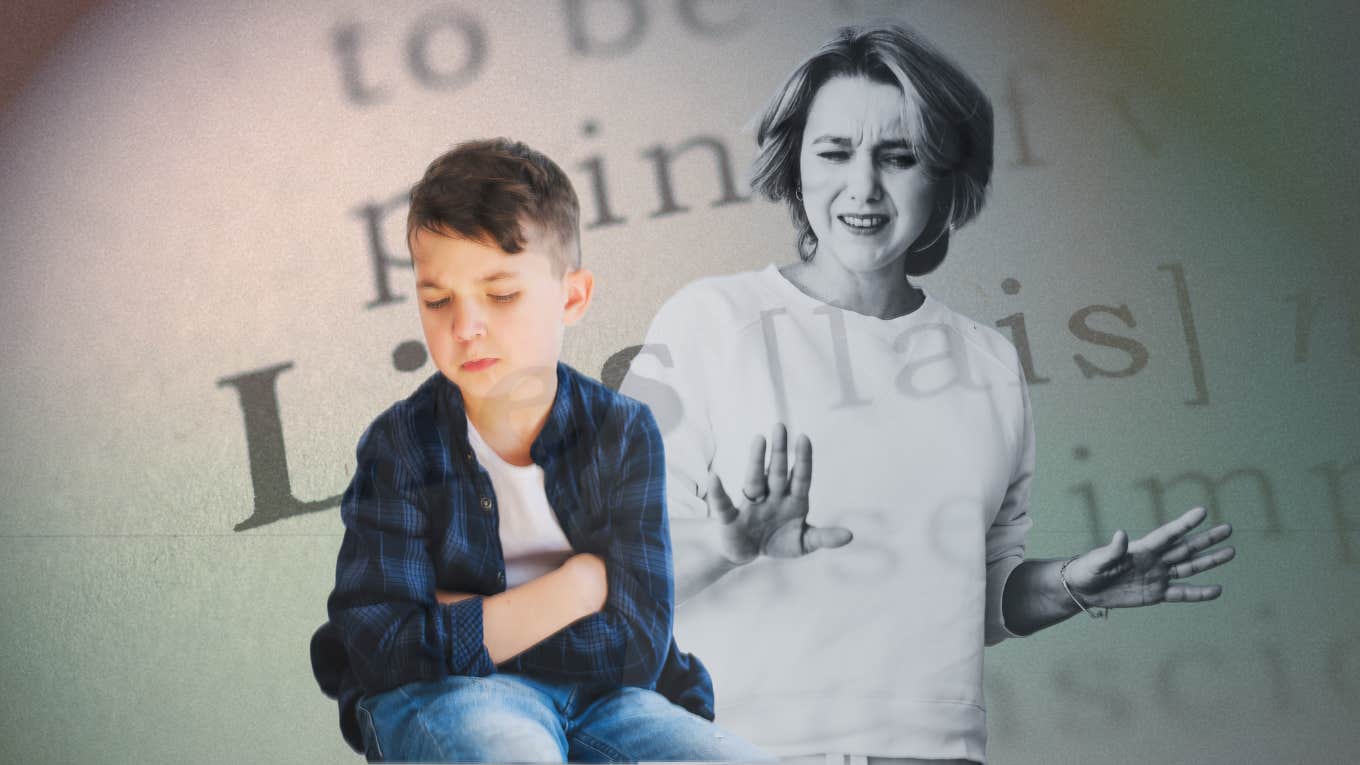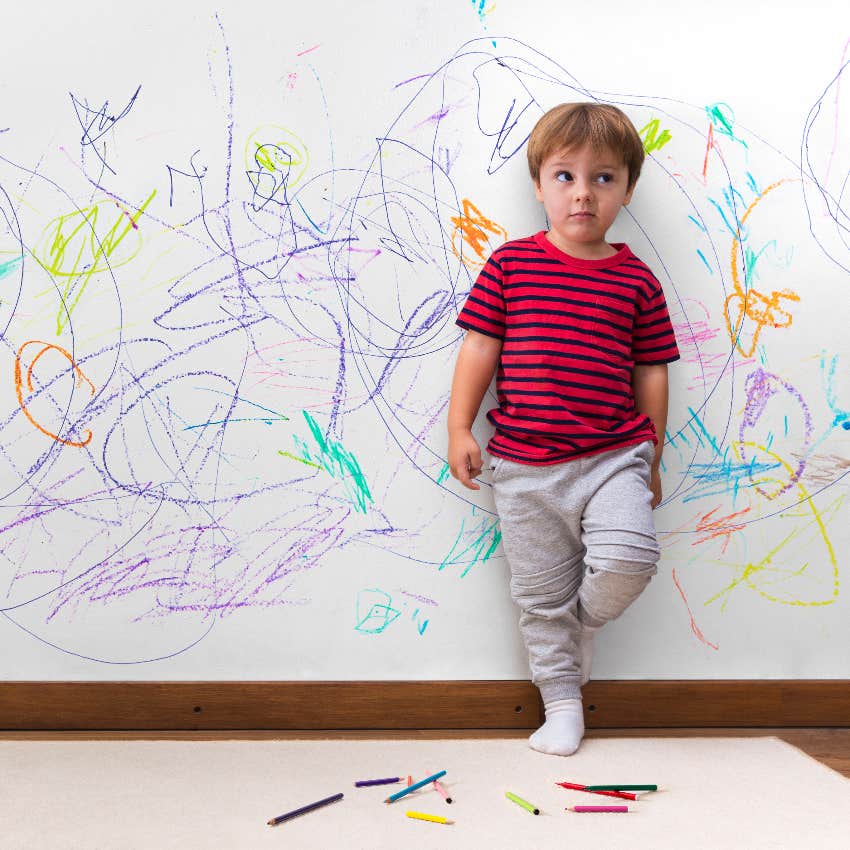The Habit That Messes Kids Up — That Parents Don't Even Realize
Lying is developmentally appropriate for kids.
 Devonyu, Karolina Grabowska | Canva, Elena_Goncharova | Shutterstock
Devonyu, Karolina Grabowska | Canva, Elena_Goncharova | Shutterstock So many parents in today’s child-centered culture refuse to entertain the notion that their children are capable of dishonesty. Yet, kids, like all humans, lie.
They lie for many reasons, and this can be developmentally appropriate and even a positive sign in some cases (e.g., that they understand what other people expect of them and therefore are capable of perspective-taking).
Here, I will cover some reasons kids lie and how parents pretending they don’t, and overtrusting them, can unintentionally hurt your child.
To understand what I’m discussing here, you need to first understand that there are stages of moral development (some of you may remember Kohlberg’s stages of moral development from a psychology class).
Problems arise when parents overestimate their children’s moral capacity, and think that their children have the moral development of a young adult.
They do not. They just want to be a “good kid” and avoid trouble. They do not understand larger philosophical and moral issues yet.
Here are some common ways this desire to conceive of your child as a truth-telling, trustworthy mini-adult misfire:
Aidan hits Ethan at school over a dispute. Aidan has been taught in the home to be a pacifist and fears that he will disappoint Mom if he tells Mom the truth. Aidan lies and says that Ethan hit him unprovoked.
The mom, who in addition to pacifism has extolled the virtue of honesty, even going so far as to say, “If you tell me the truth you’ll never get in trouble," thinks, “Why would Aidan lie to me when he knows I’m always on his side and I don’t believe in punishing him if he tells the truth?” She is horrified when the teacher says she witnessed the interaction and says things like, “You must have been standing too far away to see what happened.”
Aidan draws on the wall. He blames his brother, who cannot speak yet, and who is not his mother’s secret favorite.
His dad says “That’s the work of a four-year-old, not a two-year-old,” but Aidan’s mom repeats the mantra, “Aidan tells the truth, he knows he wouldn’t get in trouble so why would he lie?” His brother resents him, even at this pre-verbal age. So does his dad, TBH.
Advertisement
 Alex Photo Stock | Shutterstock
Alex Photo Stock | Shutterstock
Aidan is a teenager and throws a house party. He blames the idea on friends and his brother. His brother punches him in the face for being such a liar and Aidan’s mom remains confused as to why her sons don’t get along despite all her efforts.
Aidan cheats on his first girlfriend. He lies when caught and when he is confronted with evidence, he says the girl seduced him. His girlfriend gives him a pass but her self-esteem goes down the crapper.
Advertisement
While I am getting into the whole saga of poor bubble-wrapped Aidan, the future white-collar criminal, I’ll save it for a novel I write when my kids are grown and backtrack to the point of this post: Kids lie.
They lie to avoid being thought of as a “bad kid” and to get out of trouble. The more you trust a kid who is lying to you, the less they respect you and the more internal shame they feel.
They think, subconsciously, “It must be the worst thing on earth to be a liar if mom cannot recognize I’m doing it and if she defends my lie to other people so intensely. I must be the only bad kid who lies this way. I better keep it up because Mom will look pretty stupid to others if anyone finds out she was defending this lie. In this house, IMAGE IS EVERYTHING.”
Here’s another way to respond when your kid comes home with a story in which he seems to be the hero and some other kid/teacher/human is the villain:
Aidan: Ethan hit me out of nowhere!
Mom: That would be rare, for a kid to hit another kid out of nowhere. Like, whenever you hit your brother, it’s because he took something of yours. What happened to make him upset?
Aidan: Nothing!
Mom: Okay, again, that would be pretty weird. Why don’t you tell me what happened with Ethan before that and we can figure everything out?
Aidan: He teased me about my lunch then I hit him, I mean, and then he hit me.
Mom: Oh, OK, so probably you were embarrassed by something and then you hit him. That happens. What was wrong with your lunch?
Aidan: Nothing but I don’t like tuna.
Mom: Okay, maybe no more tuna if the other kids make fun. Or you can always say something like, “Well, I like it!” Or even joke with them, “Well if tuna is gross then I guess I’m pretty gross, Ethan!” I mean, you and Ethan are friends so I think if you say sorry it will blow over.
Aidan: He won’t say sorry back.
Mom: He may or may not, but hitting is wrong so don’t do it. I wasn’t there so I don’t know how he meant the lunch comment, but let’s assume he was just joking. If he keeps doing it then, again, we can change your lunch or figure out other ways to respond.
Oh also, please don’t lie to me. Can you picture if I went to the teacher or Aidan’s mom and told them he had hit you? That would be wrong, to accuse him. Everyone lies sometimes, but let’s work on it and try to tell the truth even if it’s embarrassing, OK? When I was a little kid I lied when I peed my pants because it was so embarrassing, but then I would end up smelling bad all afternoon because I was too embarrassed to ask my teacher if I could change. Lying never works out.
Aidan: Okay.
In this example, Aidan learns:
Lying is normal and something many people struggle with, even Mom. It can be changed with effort.
Mom is on his side. The side of him, real flawed human Aidan, not on the side of some perfect kid who doesn’t exist.
There are ways to repair relationships after you’ve messed up.
AdvertisementThere are numerous, infinite ways to improve a difficult interpersonal situation and these can be discussed openly with parents if you tell them what’s going on.
You can see the same types of interactions helping Aidan in his other scenarios as well. With this type of accepting, but firm parenting, Aidan will hopefully progress more readily into post-conventional morality (universal principles and ethics, which not all adults get to).
One day he will help his own kids with issues of honesty, ethics and morality, and use these same skills in his career and relationships.
He is no longer on the path of amoral white-collar crime, sadly for the plotline of my potential novel.
Moral of the story: Investigate your kids’ fishy stories.
Make lying an accepted thing that we all have to struggle with. Read up on Elizabeth Loftus’ false memory research: kids lie all the time and terrible things happen when adults over-believe them.
Dr. Samantha Rodman Whiten, aka Dr. Psych Mom, is a clinical psychologist in private practice and the founder of DrPsychMom. She works with adults and couples in her group practice Best Life Behavioral Health.

